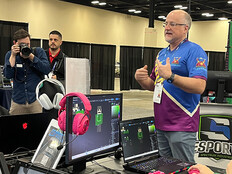“I talk to educators and administrators every day, and the most important thing to know is that you are doing great work,” he emphasized to the audience during his presentation at the 2021 Future of Education Technology Conference, which itself has moved online in response to the pandemic.
Konopelko discussed the challenges that have faced school and district administrators during the pandemic and emphasized the importance of looking beyond tried-and-true approaches that may no longer be applicable to the current times. He also noted that this moment presents an opportunity to modernize collaboration practices.
“These leadership models are built on relationships and are built on a system that was face to face,” he said. “Digital tools have become the center of our world.”
In his session, Konopelko emphasized a number of key points. Among them:
- Make room for “in-between” moments. In the past, many conversations happened spontaneously between coworkers or in small groups. In a remote world, such discussions require new approaches. Konopelko highlighted what he learned from a podcast discussion with CC Chung, Hawaii’s 2020 teacher of the year, about the importance of “in-between moments” — which matter for both students and staff. “What I think we tend to overlook is that not only do our students need those but also our staff and our teachers need the benefits of those in-between moments,” he said.
- Take a strong approach to virtual meetings. With so many discussions happening in a videoconferencing format, Konopelko emphasized the importance of preparation so that participants don’t feel lost. “We don’t want people spending the first 10 minutes of a call looking for the information for that call,” he said. It’s also important that meeting tools such as Zoom be built with small discussions in mind, using breakout rooms for larger meetings.
- Use clear communication with the team during changing times. With frequent shifts between fully virtual, hybrid and other types of learning, it’s important that expectations are well established so as not to create additional hardships. “We want to make sure that our staff has as many knowns as possible and as few unknowns as we can,” he said.
Ultimately, he noted, it is important for leaders to emphasize that these are unusual times.
“We all know that what we’re seeing and what we’re feeling and what we’re going through right now is uncomfortable,” he said. “So, we need to make sure that we are saying that.”
Leaders Harness the Power of Resilience
Keeping a team on course during difficult periods can be made harder if team members aren’t feeling supported.
During his opening keynote Tuesday, researcher and author Marcus Buckingham highlighted lessons learned while researching the subject of resilience for the ADP Research Institute, where he serves as head of people and performance research.
“Resilience describes your capacity to take on challenges and obstacles that might hit you, and you won’t just bounce back but bounce up to a new plane of being, a new plane of contribution,” he said.
Often, he said, the factors that drive resilience are not related to demographics. The main factor that created resilience was proximity to change, including the closure of a physical space or even knowing someone affected by COVID-19. His research found that those who had experienced five changes at work were 13.2 times more likely to be highly resilient.
He emphasized the importance of leaders being clear about what’s happening. In the case of schools, he said, administrators should regularly speak up on issues in clear terms.
“Humans actually like specific change. We like it; tell us what it is,” he said. “Tell us why. We can deal with it super well. We’re more frightened of the unknown disease.”
Another factor that helps foster resilience is a feeling of support. Team leaders, he said, can play an important role on this front by frequently checking in with their staff members for 15-minute meetings each week.
“Checking in is a short-term, future-focused conversation where all you’re doing is asking the person, ‘What are your priorities for this coming week and how can I help you?’” Buckingham said.
He emphasized, however, that check-ins should not be focused on relaying information but on listening to staff concerns.
“What matters is that your team member feels as though you, every single week, are asking a couple of short, open-ended questions. That’s it,” he added.
EdTech is covering FETC, so bookmark this page for conference coverage. Follow @EdTech_K12 on Twitter for live updates, and join the conversation at #FETC.











